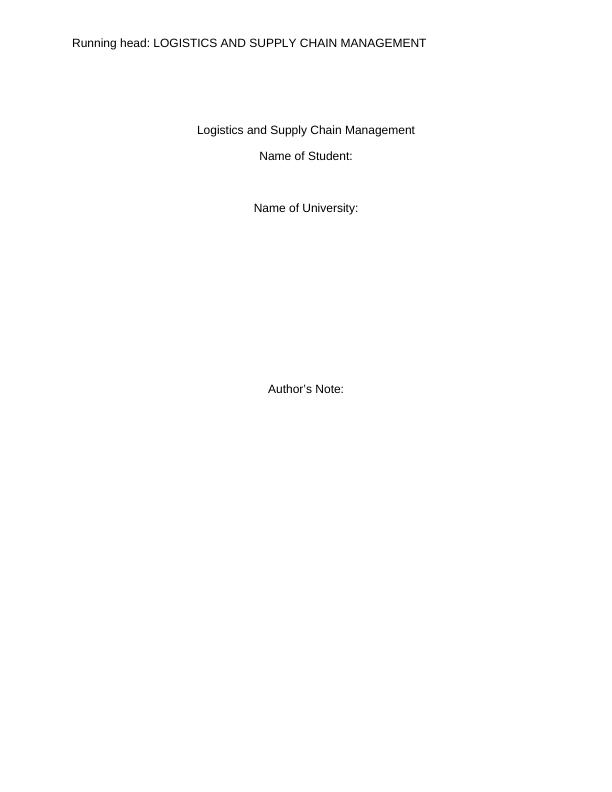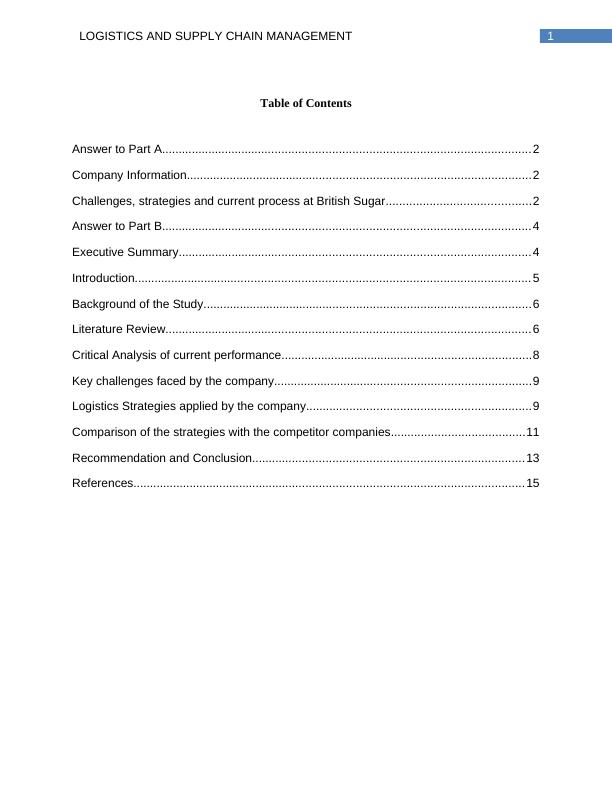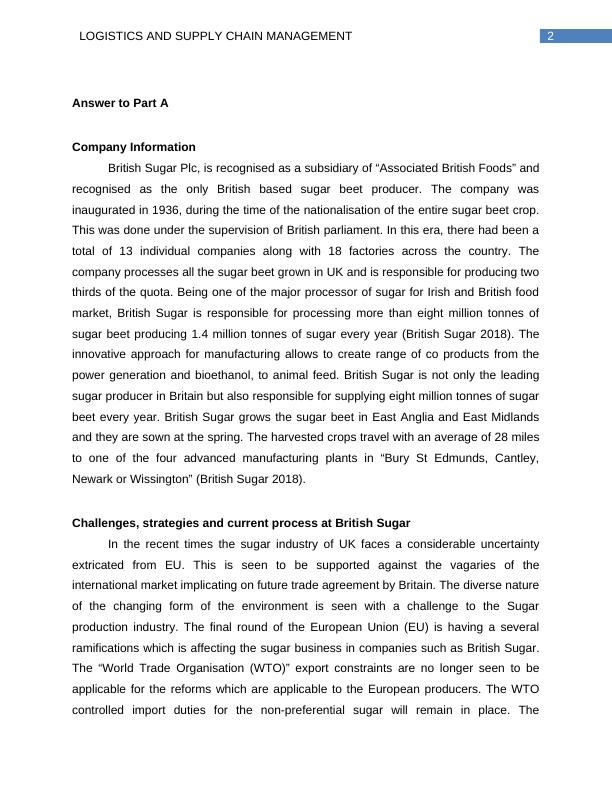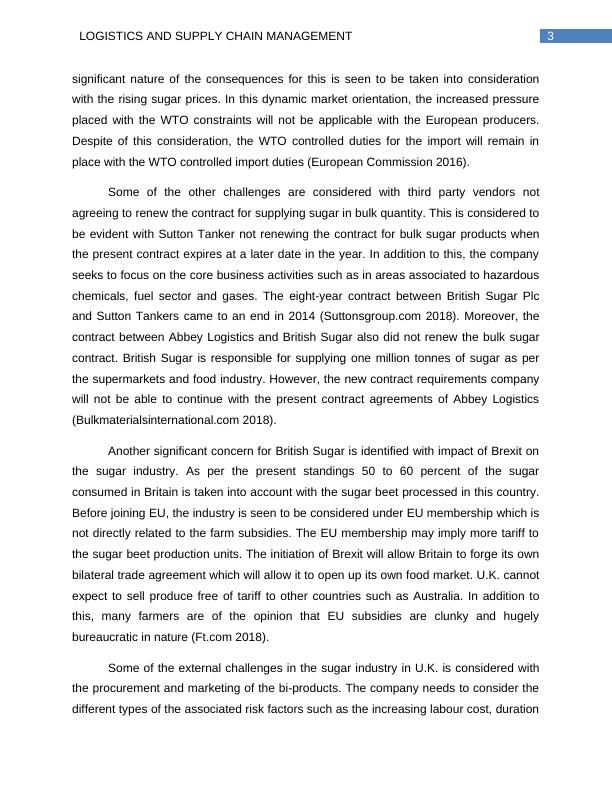Logistics and Supply Chain Management
Added on 2023-06-15
20 Pages7006 Words362 Views
Running head: LOGISTICS AND SUPPLY CHAIN MANAGEMENT
Logistics and Supply Chain Management
Name of Student:
Name of University:
Author’s Note:
Logistics and Supply Chain Management
Name of Student:
Name of University:
Author’s Note:

1LOGISTICS AND SUPPLY CHAIN MANAGEMENT
Table of Contents
Answer to Part A.............................................................................................................. 2
Company Information.......................................................................................................2
Challenges, strategies and current process at British Sugar...........................................2
Answer to Part B.............................................................................................................. 4
Executive Summary......................................................................................................... 4
Introduction...................................................................................................................... 5
Background of the Study..................................................................................................6
Literature Review............................................................................................................. 6
Critical Analysis of current performance...........................................................................8
Key challenges faced by the company.............................................................................9
Logistics Strategies applied by the company...................................................................9
Comparison of the strategies with the competitor companies........................................11
Recommendation and Conclusion.................................................................................13
References.....................................................................................................................15
Table of Contents
Answer to Part A.............................................................................................................. 2
Company Information.......................................................................................................2
Challenges, strategies and current process at British Sugar...........................................2
Answer to Part B.............................................................................................................. 4
Executive Summary......................................................................................................... 4
Introduction...................................................................................................................... 5
Background of the Study..................................................................................................6
Literature Review............................................................................................................. 6
Critical Analysis of current performance...........................................................................8
Key challenges faced by the company.............................................................................9
Logistics Strategies applied by the company...................................................................9
Comparison of the strategies with the competitor companies........................................11
Recommendation and Conclusion.................................................................................13
References.....................................................................................................................15

2LOGISTICS AND SUPPLY CHAIN MANAGEMENT
Answer to Part A
Company Information
British Sugar Plc, is recognised as a subsidiary of “Associated British Foods” and
recognised as the only British based sugar beet producer. The company was
inaugurated in 1936, during the time of the nationalisation of the entire sugar beet crop.
This was done under the supervision of British parliament. In this era, there had been a
total of 13 individual companies along with 18 factories across the country. The
company processes all the sugar beet grown in UK and is responsible for producing two
thirds of the quota. Being one of the major processor of sugar for Irish and British food
market, British Sugar is responsible for processing more than eight million tonnes of
sugar beet producing 1.4 million tonnes of sugar every year (British Sugar 2018). The
innovative approach for manufacturing allows to create range of co products from the
power generation and bioethanol, to animal feed. British Sugar is not only the leading
sugar producer in Britain but also responsible for supplying eight million tonnes of sugar
beet every year. British Sugar grows the sugar beet in East Anglia and East Midlands
and they are sown at the spring. The harvested crops travel with an average of 28 miles
to one of the four advanced manufacturing plants in “Bury St Edmunds, Cantley,
Newark or Wissington” (British Sugar 2018).
Challenges, strategies and current process at British Sugar
In the recent times the sugar industry of UK faces a considerable uncertainty
extricated from EU. This is seen to be supported against the vagaries of the
international market implicating on future trade agreement by Britain. The diverse nature
of the changing form of the environment is seen with a challenge to the Sugar
production industry. The final round of the European Union (EU) is having a several
ramifications which is affecting the sugar business in companies such as British Sugar.
The “World Trade Organisation (WTO)” export constraints are no longer seen to be
applicable for the reforms which are applicable to the European producers. The WTO
controlled import duties for the non-preferential sugar will remain in place. The
Answer to Part A
Company Information
British Sugar Plc, is recognised as a subsidiary of “Associated British Foods” and
recognised as the only British based sugar beet producer. The company was
inaugurated in 1936, during the time of the nationalisation of the entire sugar beet crop.
This was done under the supervision of British parliament. In this era, there had been a
total of 13 individual companies along with 18 factories across the country. The
company processes all the sugar beet grown in UK and is responsible for producing two
thirds of the quota. Being one of the major processor of sugar for Irish and British food
market, British Sugar is responsible for processing more than eight million tonnes of
sugar beet producing 1.4 million tonnes of sugar every year (British Sugar 2018). The
innovative approach for manufacturing allows to create range of co products from the
power generation and bioethanol, to animal feed. British Sugar is not only the leading
sugar producer in Britain but also responsible for supplying eight million tonnes of sugar
beet every year. British Sugar grows the sugar beet in East Anglia and East Midlands
and they are sown at the spring. The harvested crops travel with an average of 28 miles
to one of the four advanced manufacturing plants in “Bury St Edmunds, Cantley,
Newark or Wissington” (British Sugar 2018).
Challenges, strategies and current process at British Sugar
In the recent times the sugar industry of UK faces a considerable uncertainty
extricated from EU. This is seen to be supported against the vagaries of the
international market implicating on future trade agreement by Britain. The diverse nature
of the changing form of the environment is seen with a challenge to the Sugar
production industry. The final round of the European Union (EU) is having a several
ramifications which is affecting the sugar business in companies such as British Sugar.
The “World Trade Organisation (WTO)” export constraints are no longer seen to be
applicable for the reforms which are applicable to the European producers. The WTO
controlled import duties for the non-preferential sugar will remain in place. The

3LOGISTICS AND SUPPLY CHAIN MANAGEMENT
significant nature of the consequences for this is seen to be taken into consideration
with the rising sugar prices. In this dynamic market orientation, the increased pressure
placed with the WTO constraints will not be applicable with the European producers.
Despite of this consideration, the WTO controlled duties for the import will remain in
place with the WTO controlled import duties (European Commission 2016).
Some of the other challenges are considered with third party vendors not
agreeing to renew the contract for supplying sugar in bulk quantity. This is considered to
be evident with Sutton Tanker not renewing the contract for bulk sugar products when
the present contract expires at a later date in the year. In addition to this, the company
seeks to focus on the core business activities such as in areas associated to hazardous
chemicals, fuel sector and gases. The eight-year contract between British Sugar Plc
and Sutton Tankers came to an end in 2014 (Suttonsgroup.com 2018). Moreover, the
contract between Abbey Logistics and British Sugar also did not renew the bulk sugar
contract. British Sugar is responsible for supplying one million tonnes of sugar as per
the supermarkets and food industry. However, the new contract requirements company
will not be able to continue with the present contract agreements of Abbey Logistics
(Bulkmaterialsinternational.com 2018).
Another significant concern for British Sugar is identified with impact of Brexit on
the sugar industry. As per the present standings 50 to 60 percent of the sugar
consumed in Britain is taken into account with the sugar beet processed in this country.
Before joining EU, the industry is seen to be considered under EU membership which is
not directly related to the farm subsidies. The EU membership may imply more tariff to
the sugar beet production units. The initiation of Brexit will allow Britain to forge its own
bilateral trade agreement which will allow it to open up its own food market. U.K. cannot
expect to sell produce free of tariff to other countries such as Australia. In addition to
this, many farmers are of the opinion that EU subsidies are clunky and hugely
bureaucratic in nature (Ft.com 2018).
Some of the external challenges in the sugar industry in U.K. is considered with
the procurement and marketing of the bi-products. The company needs to consider the
different types of the associated risk factors such as the increasing labour cost, duration
significant nature of the consequences for this is seen to be taken into consideration
with the rising sugar prices. In this dynamic market orientation, the increased pressure
placed with the WTO constraints will not be applicable with the European producers.
Despite of this consideration, the WTO controlled duties for the import will remain in
place with the WTO controlled import duties (European Commission 2016).
Some of the other challenges are considered with third party vendors not
agreeing to renew the contract for supplying sugar in bulk quantity. This is considered to
be evident with Sutton Tanker not renewing the contract for bulk sugar products when
the present contract expires at a later date in the year. In addition to this, the company
seeks to focus on the core business activities such as in areas associated to hazardous
chemicals, fuel sector and gases. The eight-year contract between British Sugar Plc
and Sutton Tankers came to an end in 2014 (Suttonsgroup.com 2018). Moreover, the
contract between Abbey Logistics and British Sugar also did not renew the bulk sugar
contract. British Sugar is responsible for supplying one million tonnes of sugar as per
the supermarkets and food industry. However, the new contract requirements company
will not be able to continue with the present contract agreements of Abbey Logistics
(Bulkmaterialsinternational.com 2018).
Another significant concern for British Sugar is identified with impact of Brexit on
the sugar industry. As per the present standings 50 to 60 percent of the sugar
consumed in Britain is taken into account with the sugar beet processed in this country.
Before joining EU, the industry is seen to be considered under EU membership which is
not directly related to the farm subsidies. The EU membership may imply more tariff to
the sugar beet production units. The initiation of Brexit will allow Britain to forge its own
bilateral trade agreement which will allow it to open up its own food market. U.K. cannot
expect to sell produce free of tariff to other countries such as Australia. In addition to
this, many farmers are of the opinion that EU subsidies are clunky and hugely
bureaucratic in nature (Ft.com 2018).
Some of the external challenges in the sugar industry in U.K. is considered with
the procurement and marketing of the bi-products. The company needs to consider the
different types of the associated risk factors such as the increasing labour cost, duration

End of preview
Want to access all the pages? Upload your documents or become a member.
Related Documents
Logistics and Supply Chain Management of British Sugarlg...
|13
|1088
|410
